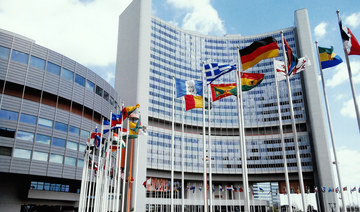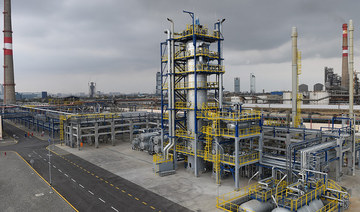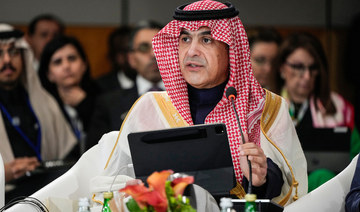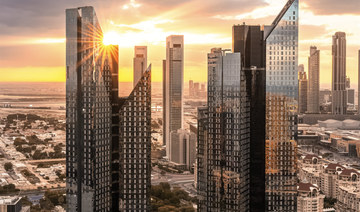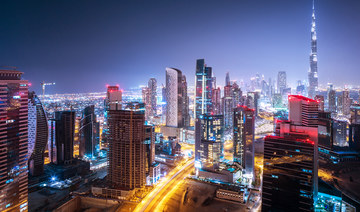Oil prices slipped $2 a barrel in early Asian trading on Monday, following a second straight weekly decline after world consumers announced plans to release a record volume of crude and oil products from strategic stocks and as China lockdowns continued.
Brent crude fell $2.04, or 2 percent, to $100.74 a barrel at 0139 GMT, while US West Texas Intermediate crude lost $1.94, or 2 percent, to $96.32. Last week, Brent dropped 1.5 percent while US oil slid 1 percent. For several weeks, the benchmarks have been at their most volatile since June 2020.
The market has been watching developments in China, where authorities have kept Shanghai, a city of 26 million people, locked down under its “zero tolerance” for COVID-19. China is the world’s biggest oil importer.
Member nations of the International Energy Agency (IEA) will release 60 million barrels over the next six months, with the United States matching that amount as part of its 180 million barrel release announced in March. The moves are aimed at offsetting a shortfall in Russian crude after Moscow was hit with heavy sanctions following its invasion of Ukraine.
“Oil is losing steam due to the joint efforts of the oil reserve release by US and the IEA countries, along with weakening demand amid China extending lockdowns, where both of the manufacturing hubs, Shenyang and Shanghai, halted broad production,” CMC Markets analyst Tina Teng said.
The unprecedented release of 240 million barrels, equivalent to well over 1 million barrels per day, has helped cool prices and sharply narrowed backwardation in oil price curves, where prices in prompt months are higher than those in future months.
However, it is unclear whether that will fully offset the shortfall in Russian oil as exports continued, with India, lured by steep discounts, increasing imports.
On Monday, President Joe Biden will meet virtually with Indian Prime Minister Narendra Modi, the White House said, at a time when the United States has made it clear it does not want to see an uptick in Russian energy imports by India.
Russia’s production of oil and gas condensate fell to 10.52 million bpd for April 1-6 from a March average of 11.01 million bpd.
The oil reserves release could deter producers, including the Organization of the Petroleum Exporting Countries (OPEC) and US shale producers, from accelerating output increases even with prices around $100 a barrel, ANZ Research analysts said in a note.
However, the OPEC+ group of oil exporting nations has not shown any inclination to increase its output targets more than the 400,000 barrels per day it has been adding monthly as part of a restoration of supply cuts.
In the United States, energy firms last week added oil and natural gas rigs for a third week in a row as Washington seeks more production to help its allies wean themselves off Russian oil and gas.
Oil falls, pressured by China lockdowns and release of reserves
https://arab.news/vqxah
Oil falls, pressured by China lockdowns and release of reserves

- IEA members to release 60 mln barrels over 6 months
- US producers added 13 oil rigs in the week to April 8
SFD, AfDB sign deal to finance development initiatives in Africa
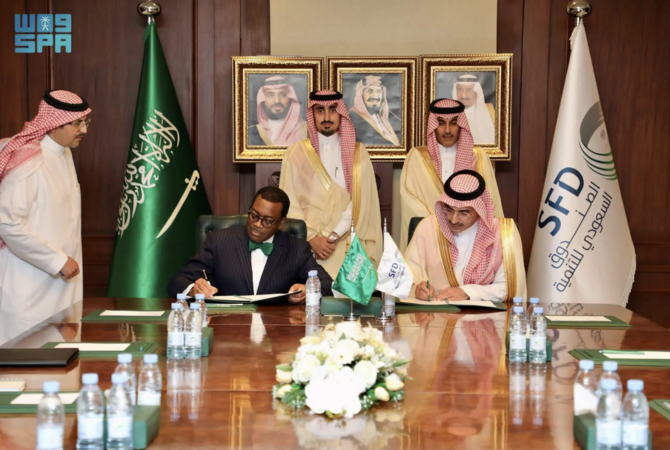
RIYADH: Developing African countries are poised to receive a funding boost for growth initiatives following a deal with the Saudi Fund for Development, aiming to foster sustainable progress.
The memorandum of understanding, signed with the African Development Bank Group, aims to promote mutual objectives and activities for sustainable international development between the two parties, the Saudi Press Agency reported.
This initiative aligns with SFD’s objective to enhance both social and economic growth by creating diverse opportunities.
Moreover, the newly signed agreement aims to facilitate the exchange of knowledge and experiences while advocating for optimal co-financing strategies. It will also support the attainment of sustainable development goals and optimize the impact of these initiatives.
Additionally, the MoU also aims to enhance collaboration in pursuit of shared goals that promote the expansion of crucial opportunities in diverse beneficiary African nations, ultimately contributing to global prosperity for the most impoverished and least developed communities.
Saudi Central Bank and BIS co-host meeting on reserve management in Riyadh
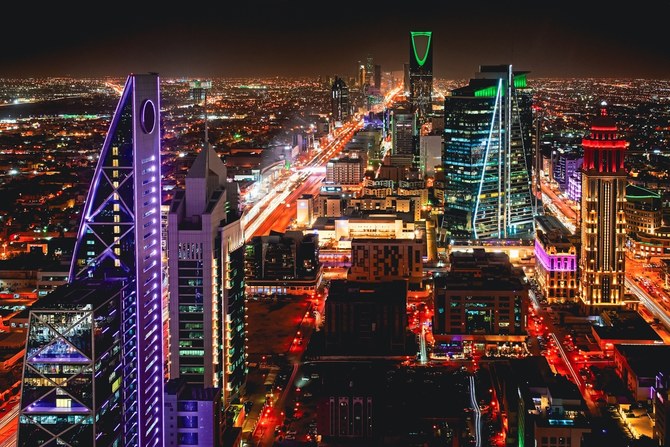
RIYADH: The evolving global landscape presents new challenges and opportunities for central bank reserve managers, the governor of Saudi Arabia’s apex financial institution explained at a high-level meeting.
Speaking at an event in Riyadh which was attended by the Bank for International Settlements, Ayman Al-Sayari set out his view on the complexities of the current macro-financial environment.
The two-day gathering, which began on April 28, brought together reserve managers and experts from central banks in the Middle East and North Africa region, as well as participants from other apex financial institutions, to discuss the latest trends in managing foreign exchange reserves.
The event served as a platform for participants to exchange insights, perspectives and expertise on the most critical aspects of reserve management through a series of panel discussions and keynote speeches.
In March, SAMA’s monthly statistics bulletin revealed that foreign assets of Saudi Arabia’s commercial banks surged by 22 percent in February, reaching a total of SR347.63 billion ($92.7 billion) compared to the same month of the previous year.
This rise reflects a significant expansion in the commercial institutions’ international holdings and investments.
The central bank added that its net foreign assets reached SR1.55 trillion in February.
Central banks’ foreign holdings are primarily for reserve management and monetary policy purposes, while commercial banks’ foreign assets are for business operations, customer services, and investment activities.
The report added that Saudi Arabia’s total reserve holdings amounted to SR1.62 trillion, representing a five percent decline compared to the same month of 2023.
DIFC records $2.6bn in gross written premiums, highest figure in its 20-year history
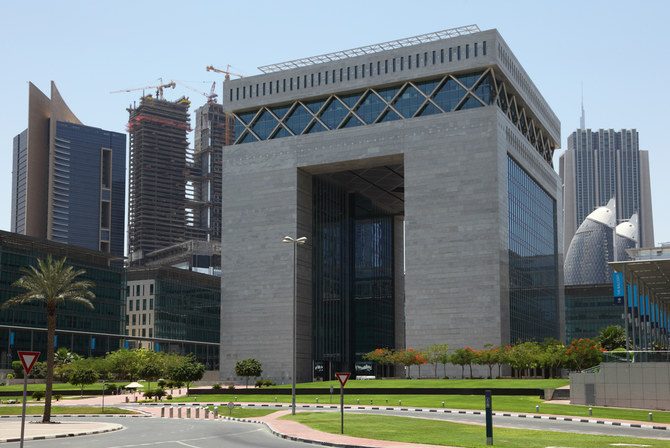
RIYADH: Dubai International Financial Centre recorded its highest gross written premiums in its 20-year history, amounting to $2.6 billion in 2023, marking a 23 percent increase from the previous year.
DIFC, a global financial center in the Middle East, Africa, and South Asia region, connects the fast-growing markets of the region with global economies and offers dining, retail, and living amenities, according to its website.
The center also recorded a 20 percent increase in the registration of insurance and reinsurance firms, including the first move of a Guernsey-based captive.
The Emirates News Agency reported that DIFC “has consolidated its position as the principal hub for the (re)insurance industry,” adding that DIFC’s appeal for managing general agents, representing 43 percent of new registrations, is a major factor shaping its insurance landscape.
This is credited to the center’s well-established regulatory framework, facilitating partnerships with cedants and brokers.
The influx of global insurers, reinsurers, and brokers, as well as captives, MGAs, and other industry stakeholders into DIFC, is driven by several factors. These include buoyant oil prices and increased infrastructure spending, as well as a focus on sustainable projects and low insurance penetration in the region.
Among the notable entities to join DIFC’s insurance sector in the past year are Alif Limited, Arc Insurance and Reinsurance Limited, and Barents Risk Management Limited. Joining them are BharatRe Global Ltd. and many more, it added.
Arif Amiri, CEO of DIFC Authority, emphasized the center’s role as a global industry hub, hosting over 120 registered insurers, reinsurers, captives, MGAs, and related entities.
The significance of DIFC’s stature in the insurance domain is further underscored by its co-hosting of the Dubai World Insurance Congress, featuring discussions on key themes reshaping the industry’s future, including innovation, capital attraction, and talent development.
In 2023, a survey conducted at DWIC revealed an 87 percent confidence in the Middle East, Africa, and Southern Asia market’s strategic opportunities. Property, health, energy, cyber, and liability lines of business were identified as holding the most potential. The survey also highlighted an 85 percent confidence rate in renewals and client retention.
Over two decades, DIFC has fostered the growth of the insurance and reinsurance industry, attracting talent and expertise to access key markets in the Middle East, Asia, and Africa.
The center hosts major insurance brokers, five of which are top ranked by the specialized insurance credit rating agency, AM Best. This has contributed to a significant 61 percent increase in brokered premiums compared to 2022, surpassing the $2 billion mark and solidifying DIFC’s position as a global market for insurance and reinsurance placements.
Dubai Real Estate Brokers Program attracts 25 strategic partnerships
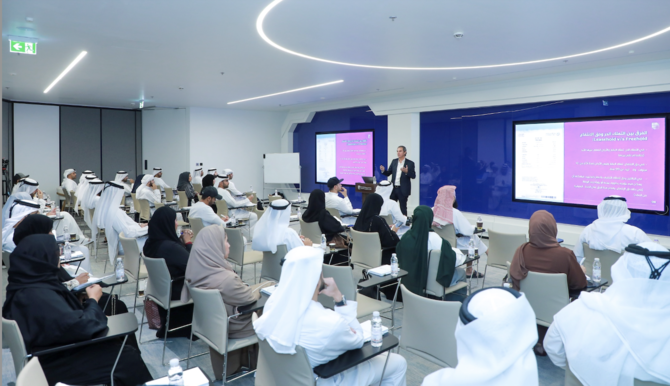
RIYADH: Dubai’s property market is set to grow, with the Real Estate Brokers Program securing 25 partnerships with brokerage companies and developers in the private sector.
According to a press statement, the first phase of the program, launched in mid-March and headed by the Dubai Land Department, also received over 1,000 registrations from Emirati citizens.
Dubai Real Estate Brokers Program aims to increase the proportion of citizen brokers from 5 percent to 15 percent over the next three years to enhance the participation of young citizens in the Emirate’s developmental initiatives across various key sectors.
“This reflects the early positive impact of the program, showcasing citizens’ aspirations and eagerness to engage as real estate brokers and acknowledging the pivotal role of Dubai’s real estate sector locally and globally,” said Marwan bin Ghalita, acting director general of Dubai Land Department.
The initiative also aligns with Dubai Social Agenda 33, which seeks to triple the number of Emiratis working in the private sector.
Ghalita added that the program will help young talents in the nation enhance their productivity, therefore contributing to Dubai’s economic growth.
“Dubai consistently offers outstanding examples of collaboration and synergy between the private and public sectors,” said Ghalita.
He added: “With the program’s enrollment exceeding 1,000 citizens and real estate companies continuing to join the strategic alliance within a short period, we are diligently working toward achieving all the ambitious goals of the Dubai Real Estate Brokers Programme. In particular, Emirati real estate brokers will increase from 5 percent to 15 percent over the next three years.”
The program also encompasses additional initiatives, including Emirati real estate broker licensing, encouraging property developers to allocate a portion of their sales to local agents, and empowering citizens in the property sector.
Under the partnership with the private sector, citizen participants will receive various support packages to enhance the competitive edge of UAE people and enable them to take up roles in the real estate sector.
The press statement added that efforts would also be made to allocate 10 percent to 15 percent of the development company’s sales to be marketed by Emirati real estate brokers, therefore contributing to the empowerment of national citizens by offering them employment opportunities in the property market.
Dubai ruler approves new $35bn airport terminal
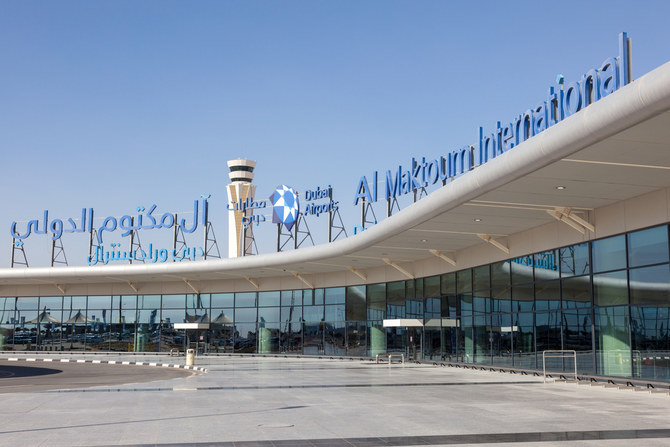
CAIRO: Dubai’s ruler Sheikh Mohammed bin Rashid Al-Maktoum approved a new passenger terminal in Al Maktoum International airport worth 128 billion dirhams ($34.85 billion), he said on Sunday in a post on X.
The Al Maktoum International Airport will be the largest in the world with a capacity of up to 260 million passengers, and five times the size of Dubai International Airport, he added, saying that all operations at Dubai airport would be transferred to Al Maktoum in the coming years.
The Al Maktoum airport will also include 400 terminal gates and five runways, he said.
The airport will be the new home of flagship carrier Emirates and its sister low-cost airline Flydubai along with all airline partners connecting the world to and from Dubai, Dubai state-owned airline Emirates chairman Sheikh Ahmed bin Saeed Al-Maktoum said.
The move “further solidifies Dubai’s position as a leading aviation hub on the world stage,” the CEO of Dubai Airports, Paul Griffiths, was quoted as saying by the Dubai Media Office.



